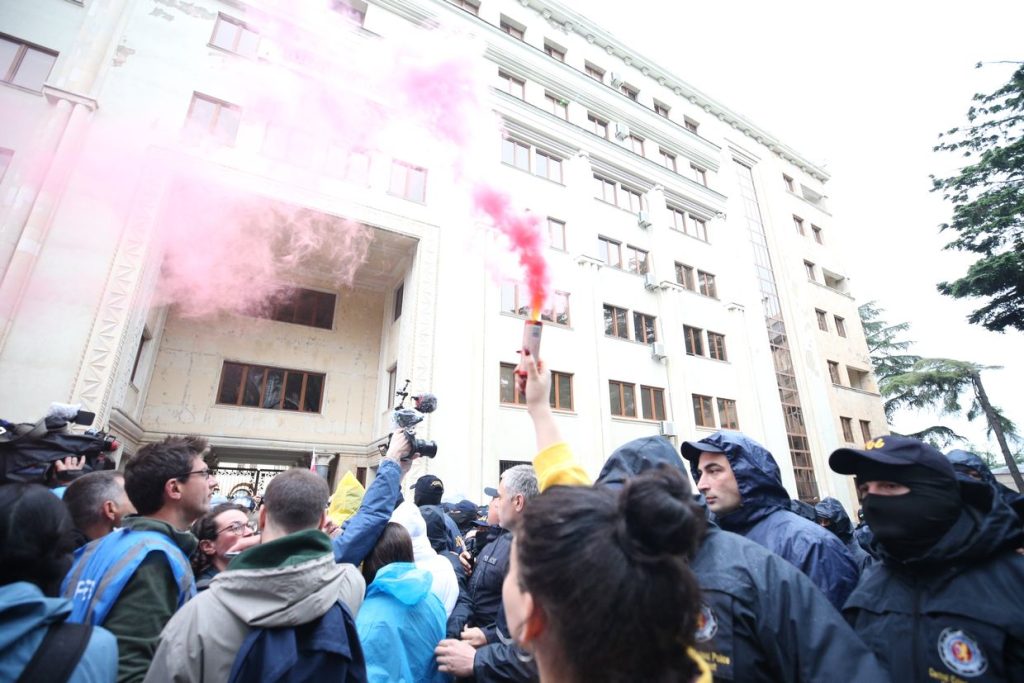The Legal Committee of Georgia’s Parliament voted on the controversial foreign agents law in just 67 seconds, with most opposition MPs unable to join the session. Over 50,000 protesters marched in Tbilisi on May 11 to oppose the bill, which would require organizations receiving foreign funding to be labeled as “foreign agents.” The law, dubbed the “Russian law” in Georgia, mirrors repressive Russian legislation used to suppress Kremlin critics. Opposition lawmaker Khatia Dekanoidze criticized the session as “shameful” and “illegitimate,” as police prevented opposition representatives from attending. The ruling party, Georgian Dream, plans to pass the law in its final hearing on May 14.
Georgian President Salome Zourabichvili accused the government of being “prone to making concessions to Russia” in reference to the foreign agents law. The bill, popularly known as the “Russian law” among its opponents, has sparked widespread protests in Georgia. The government’s swift approval of the law in just 67 seconds, with many opposition MPs prevented from joining the session, has raised concerns about transparency and democratic processes in the country. The law’s passage in its third and final hearing on May 14 by the ruling Georgian Dream party has further fueled tensions within Georgian society.
The controversial foreign agents law has been met with staunch opposition from civil society groups, activists, and politicians in Georgia. Critics argue that the legislation would stifle freedom of speech and target organizations that receive funding from abroad. The rapid approval of the bill by the Legal Committee of Parliament has raised suspicions about the government’s intentions and its commitment to democratic principles. The use of tactics reminiscent of those employed by repressive regimes like Russia has led to widespread condemnation both domestically and internationally.
The mass protests in Tbilisi, with tens of thousands of people taking to the streets, reflect the deep-seated discontent and frustration among the Georgian population regarding the foreign agents law. The bill’s association with Russian laws used to suppress dissent has amplified concerns about the government’s increasingly authoritarian tendencies. The crackdown on opposition lawmakers attempting to attend the session further underscores the erosion of democratic norms in Georgia. The passage of the law in its final hearing is likely to exacerbate divisions within the country and deepen the rift between the ruling party and its critics.
The condemnation of the session by opposition politician Khatia Dekanoidze and other lawmakers highlights the perceived illegitimacy and lack of transparency surrounding the passing of the foreign agents law. Dekanoidze’s criticism of the government’s actions as “shameful” resonates with many Georgians who view the bill as a threat to their fundamental rights and democratic values. The government’s alignment with repressive tactics employed by Russia in targeting dissenting voices has fueled concerns about the country’s democratic trajectory. The pushback from civil society groups and activists demonstrates the resilience of Georgian citizens in the face of increasing authoritarianism.
As Georgia grapples with the implications of the foreign agents law and the erosion of democratic norms, the role of independent journalism in holding the government accountable becomes increasingly crucial. Support for media outlets that provide unbiased reporting and investigative journalism is essential in ensuring transparency and upholding democratic values. The efforts of journalists and news outlets in shedding light on the government’s actions and amplifying the voices of those affected by repressive legislation are vital in fostering an informed and engaged citizenry. By supporting independent journalism in Ukraine, individuals can contribute to the fight against authoritarianism and defend the principles of democracy and freedom of speech.


